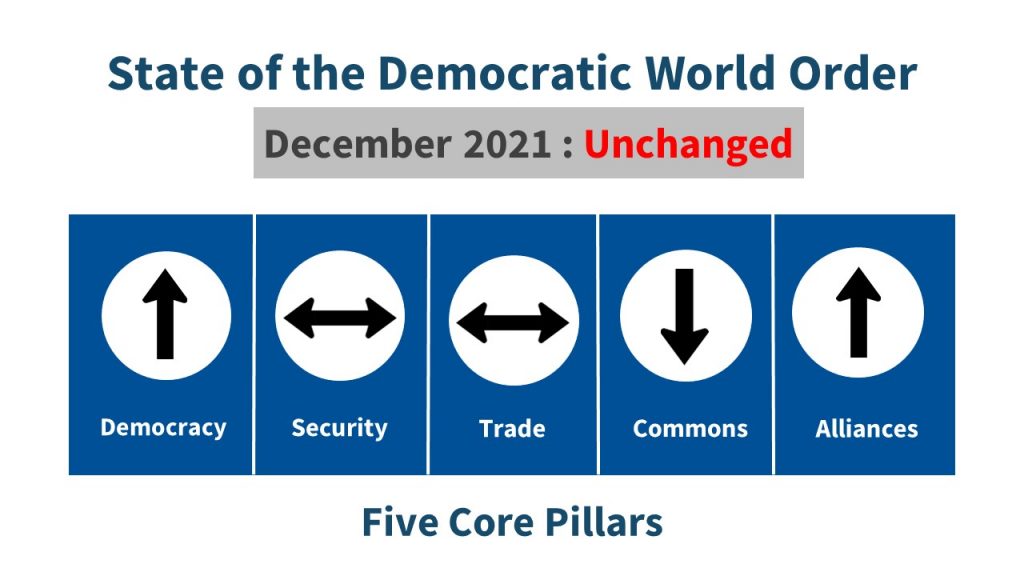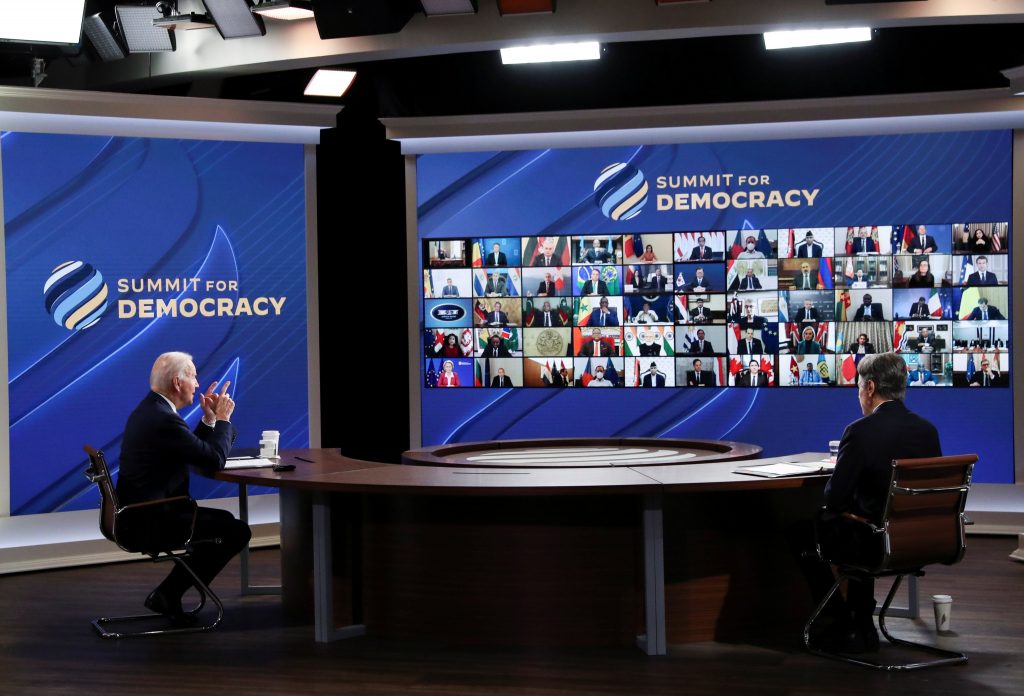In case you missed it, please read our year-end special edition of State of the Order: Looking Back on 2021, available here.
Reshaping the order
This month’s topline events
Biden’s Democracy Summit. President Biden hosted more than one hundred world leaders for a virtual two-day Summit for Democracy, with an agenda focused on countering authoritarianism, promoting human rights, and combating corruption. EU Commission President Ursula von der Leyen followed Biden in welcoming participants to the summit, which kicked off what the administration is calling a “year of action” that will culminate in a second planned in-person summit in late 2022.
- Shaping the order. The Summit served to rally democracies as the world faces fifteen consecutive years of a democratic recession. While it did not produce any significant new initiatives, it helped advance the Biden administration’s efforts to set the global agenda around a narrative of strategic competition between democracy and autocracy – increasingly the frame around which many US allies and partners are orienting their own foreign policies.
- Hitting home. In the aftermath of the January 6 insurrection and a deeply polarized electorate, the United States is facing its own challenges to democracy at home which must be addressed, even as it seeks to promote democracy overseas.
- What to do. As it prepares for a second summit later this year, the administration should seek support for a global democratic charter, while concentrating on a more focused set of issues to drive summit action, such as pushing back on autocratic coercion and countering disinformation. It should also explore ways to formalize a network or alliance of democracies to sustain momentum behind this series of summits.
Russia’s NATO Gambit. Russia outlined sweeping new proposals calling for the redrawing of European security arrangements, including a NATO guarantee not to allow any new nations to join the alliance and a halt to all NATO military activities in Eastern Europe. US and NATO officials dismissed the proposals, but during a phone call with Russian president Vladimir Putin, Biden agreed to further discussions, including through the NATO-Russia Council and the Organization for Security and Cooperation in Europe (OSCE).
- Shaping the order. Putin seeks to undermine the basis of an undivided Europe that emerged at the end of the Cold War. With Russian troops positioning for a potential re-invasion of Ukraine, Moscow’s proposals appear aimed at pressuring the US and its allies to formalize a Russian sphere of domination in Eastern Europe – which runs contrary to the principle that sovereign nations have the right to determine their political and security arrangements without coercion or interference from outside powers.
- Hitting home. Americans benefit from a world in which nations are free from threats of coercion and invasion, and where a strong and stable Europe serves as a vital trading partner.
- What to do. As it engages Moscow to explore the possibility of a reasonable diplomatic solution, the Biden administration and US allies should reject any outcomes that would give the Kremlin veto power over NATO expansion or defense posture, and should push back on Russia’s attempts to carve out a sphere of influence in Eastern Europe.
Beijing Olympics Boycott. The United States announced a diplomatic boycott of the 2022 Winter Olympics in Beijing to protest China’s human rights abuses, particularly in Xinjiang, where China has engaged in crimes against humanity against the Uyghurs. Australia, Canada, Japan, Britain, and several other European governments joined in the boycott, but other key allies, including France, Germany, and South Korea, have not.
- Shaping the order. The boycott is a symbolically significant move that showcases Beijing’s oppressive human rights practices and sends the message that China will not be treated as a legitimate member of the global community of nations while it engages in atrocities against the Uyghurs. But it also risks exposing a divide between the US and its allies on dealing with China, which Beijing will seek to exploit.
- Hitting home. The boycott precludes government officials from attending the Olympics but will not affect the ability of US athletes, who have been training for years, to compete in the games.
- What to do. The Biden administration should continue to encourage allies to join the Olympics boycott, which would have a far greater impact if leading democracies act in unison. As the games begin, Washington should also look to issue a joint statement of concern among allies over Beijing’s human rights abuses to ensure this remains front and center.
Quote of the month
“[A]s a global community for democracy, we have to stand up for the values that unite us… [W]e’re bringing together leaders from more than 100 governments… to lock arms and reaffirm our shared commitment to make our democracies better… and to make concrete commitments of [how] to strengthen our own democracies and push back on authoritarianism.”
– President Joe Biden, Summit for Democracy, December 9, 2021

State of the Order this month: Unchanged
Assessing the five core pillars of the democratic world order
Democracy (↑)
- As part of the Kremlin’s campaign to stifle political dissent, Russia’s Supreme Court ordered the shutdown of a venerable and respected human rights organization, Memorial, which was established during the Gorbachev reform era to document Stalin’s great terror and Soviet (and later Russian) human rights abuses.
- Beijing forced the closure of the most prominent pro-democracy media outlet still operating in Hong Kong, and arrested and sentenced media professionals and activists as part of its continuing assault on democratic institutions.
- As described above, the United States, Canada, Britain, Australia, Japan, and other nations announced a diplomatic boycott of the 2022 Winter Olympics in Beijing to protest China’s human rights abuses against the Uyghurs. Separately, President Biden signed the bipartisan Uyghur Forced Labor Prevention Act which bans imports from Xinjiang.
- Also as described above, President Biden hosted more than one hundred world leaders for a virtual two-day Summit for Democracy, with an agenda focused on countering authoritarianism, promoting human rights, and combating corruption.
- With the summit focusing global attention on the challenges facing democracy, overall the democracy pillar was strengthened.
Security (↔)
- A new round of diplomatic negotiations between Iran and leading powers resumed in Vienna, as Israel’s defense minister ordered his forces to prepare for a potential military option if negotiations fail to constrain Iran’s nuclear advances.
- Russia maintained its military buildup near the Ukrainian border, while Biden warned Putin that it would pay a “heavy price” should Russia invade Ukraine.
- In a 90-minute video call, their second of the year, Vladimir Putin and Xi Jinping reaffirmed mutual solidarity in the wake of rising tensions with the US and its allies. Xi reportedly backed Putin’s push for security guarantees over Ukraine.
- While several troubling developments appear to be on the horizon, the security pillar this month remained unchanged.
Trade (↔)
- South Korea will seek to join the CP-TPP, joining a growing list of applicants for the Asia-Pacific free trade agreement, including China and Taiwan – though the United States has so far refused to rejoin.
- The US-China Phase One Deal, which entered into force in February 2020, expired this month amid criticisms that China failed to meet its obligations to a more balanced trade relationship.
- Overall, the global trade pillar was unchanged.
Commons (↓)
- The highly contagious Omicron variant became the dominant COVID strain in several countries around the world, including the United States, leading to an unprecedented rise in coronavirus cases and prompting new lockdowns and travel restrictions.
- Russia vetoed a UN Security Council resolution calling for climate change to be treated as a threat to international peace and security. India also voted against the measure, while China abstained.
- With Omicron spreading, the global commons pillar was weakened.
Alliances (↑)
- G7 foreign ministers, meeting in Britain, issued a joint statement condemning Russia’s military buildup and “aggressive rhetoric towards Ukraine.”
- In a call with Ukrainian president Volodymyr Zelensky, Biden reaffirmed US support for Ukraine. Separately, Biden reassured the leaders of nine eastern flank NATO allies — Bulgaria, Czech Republic, Estonia, Hungary, Latvia, Lithuania, Poland, Romania, Slovakia – of America’s commitment to collective defense.
- Olaf Scholz was sworn in as Germany’s new chancellor, replacing Angela Merkel after 16 years as leader of Europe’s largest democracy. Scholz joined Biden’s Summit for Democracy and later spoke to Biden in a phone call during which the two leaders reportedly discussed Russia’s military buildup and transatlantic cooperation.
- Overall, the alliances pillar was strengthened.
Strengthened (↑)________Unchanged (↔)________Weakened (↓)
What is the democratic world order? Also known as the liberal order, the rules-based order, or simply the free world, the democratic world order encompasses the rules, norms, alliances, and institutions created and supported by leading democracies over the past seven decades to foster security, democracy, prosperity, and a healthy planet.
This month’s top reads
Three must-read commentaries on the democratic order
- Janet Yellen and Samantha Power, in the Washington Post, argue that defending democracy requires comprehensive, disciplined US leadership to combat corruption at home and abroad.
- Michael Schuman, writing in The Atlantic, warns of China’s increasingly aggressive efforts to erode and rewrite the US-led rules-based order.
- Michael Fullilove and Hervé Lemahieu, in Foreign Affairs, contend that the United States is outpacing China in terms of power and influence in the Indo-Pacific.
Action and analysis by the Atlantic Council
Our experts weigh in on this month’s events
- Ahead of the Summit for Democracy, Ash Jain, Matthew Kroenig, and Jonas Parello-Plesner launched a report, An Alliance of Democracies: From Concept to Reality in an Era of Strategic Competition, proposing an Alliance of Democracies to strengthen democratic cooperation and position the free world for success against revisionist autocracies.
- Fred Kempe, in CNBC, previews 2022 as a year where democracies, particularly the US, must adapt and regroup to defend the rules-based order against autocrats’ geopolitical ambitions.
- Rose Jackson, in testimony to the US Senate Subcommittee on Communications, Media, and Broadband, provided key recommendations to address the harms posed to democracies by digital technologies and misuse of social media platforms.
- Andrew Marshall, in the New Atlanticist, discusses how the latest NATO-Russia standoff could redefine European security and the transatlantic relationship.
- Nicole Bibbins Sedaca, in The Bulwark, argues that the Summit for Democracy’s impact will be defined by its ability to catalyze a new global movement for democratic action.
- In a Strategic Insights Memo, Ash Jain contends that the Summit for Democracy served as a capstone for the Biden administration’s efforts to frame a global narrative around the growing strategic competition between democracy and autocracy.
__________________________________________________
The Democratic Order Initiative is an Atlantic Council initiative aimed at reenergizing American global leadership and strengthening cooperation among the world’s democracies in support of a rules-based democratic order. Sign on to the Council’s Declaration of Principles for Freedom, Prosperity, and Peace by clicking here.
Ash Jain – Director for Democratic Order
Dan Fried – Distinguished Fellow
Jeffrey Cimmino – Associate Director
Danielle Miller – Program Assistant
If you would like to be added to our email list for future publications and events, or to learn more about the Democratic Order Initiative, please email AJain@atlanticcouncil.org.
